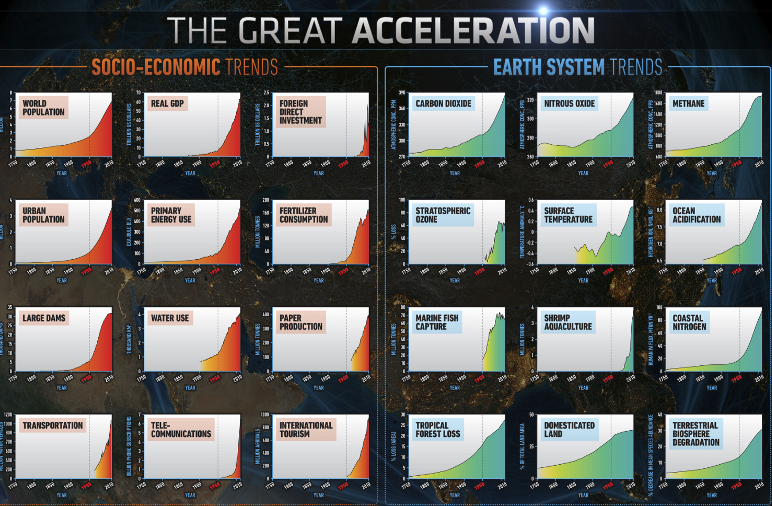Published by INSURGE intelligence, a crowdfundedinvestigative journalism platform for people and planet. Support us to report where others fear to tread.
We are living in extraordinary times and transformation is already happening and accelerating all around us. Many technological, social, and environmental changes are racing up the steep end of the exponential curve. In almost every area of our lives old structures are breaking down as we are witnessing the unfolding impacts of unprecedented technological innovation and its rapid deployment in a globally expanding consumer culture.
Exponential growth on a finite planet
‘The Great Acceleration’ is happening within the context of an expanding human population, profound societal and economic transformation on all continents, and — most urgent of all — a dangerous destabilization of global and local climate patterns. There is a scientific consensus that we need to take immediate action if we are to avoid catastrophic climate effects on the future of humankind, the diversity of life and the entire planet.
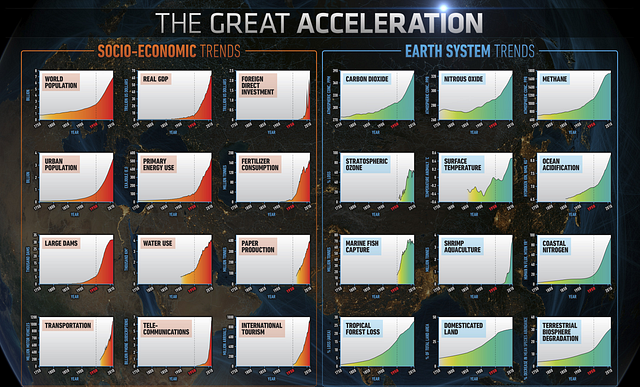 Unsustainable exponential growth in many aspects of human and ecological systems (Source)
Unsustainable exponential growth in many aspects of human and ecological systems (Source)
Already hundreds of thousands of people die every year due to climate change related extreme weather events and millions lose their homes, go hungry or are forced to migrate. Ecosystems everywhere, and the biosphere as a whole, are reaching dangerous tipping points. The prolonged impact of an industrial growth society addicted to fossil fuels and the rapid extraction of non-renewable resources is pushing against planetary boundaries.
Our current economic system is structurally committed to ever-increasing economic growth and intertwined with a financial system that generates money out of nowhere based on debt, and currencies that are not backed up by real material value (see module two). Attempts to resuscitate this structurally dysfunctional system are getting more and more expensive, as the cycles of economic crisis and costly (temporary) recovery are getting shorter and shorter.
Continuing economic crisis, along with fear of war and terrorism have effectively kept climate and environmental issues at a lower level of political priority than they ought to have as critical factors of influence on national and global security and serious threads to human wellbeing and humanity’s future survival.
Whether our structurally dysfunctional economic system can ever deliver sustainability is being questioned more and more. Not just anti-globalization activists but people within institutions such as the World Bank (Soubbotina, 2000), government think tanks (Jackson, 2009a), academia (e.g. Victor, 2010, Jackson 2009b) and the World Economic Forum (2012) are questioning the economic growth paradigm and our current version of capitalism.
 Klaus Schwab
Klaus Schwab
“Capitalism, in its current form, no longer fits the world around us […] a global transformation is urgently needed, and it must start with reinstating a global sense of social responsibility.” – Klaus Schwab, Founder of World Economic Forum, Davos in The Economic Times 2012
The evidence that inequality has devastating social and health impacts is mounting (Wilkinson, 1996, 2005, Wilkinson & Pickett 2011, Stiglitz, 2013), yet it keeps increasing in most countries and globally. Demographic changes are challenging some countries, such as Germany, Japan and the UK, with the effects of over-ageing populations, while other countries in South America, Asia, Africa and the Middle East have a growing population of disenfranchised youth with difficult economic prospects and inadequate education, facing a century of potential turmoil.
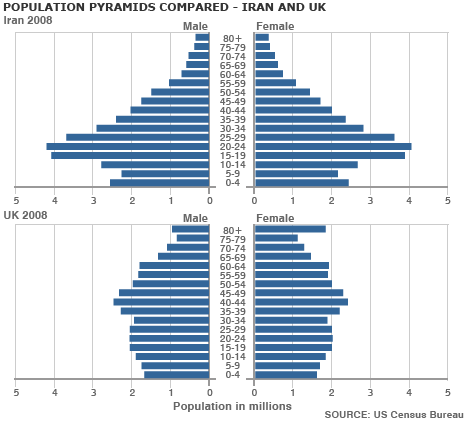
Demographic comparison Iran — UK, (Source)
Rising fundamentalism and resource conflicts over oil, water and land have led to a series of wars which have caused humanitarian crises in the Middle East, Africa and Europe as rising numbers of refugees herald another era of mass migration. Environmentally, politically, and economically induced migration are on the rise, driving potential conflicts between immigrant and resident populations, and adding to a resurgence of xenophobia just at the time when humanity has to pull together as one species in order to successfully chart the turbulent waters ahead.
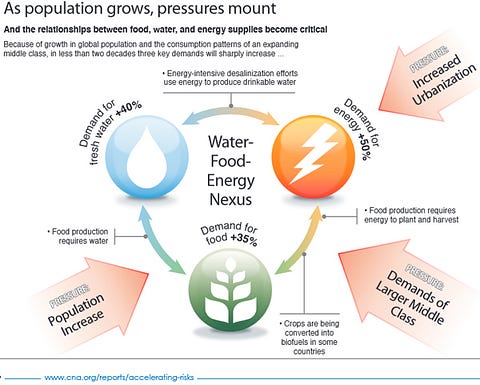
Food-Water-Energy-Nexus (Source)
Food, water and energy supply issues are already leading to localized scarcities, famine, and conflict in many parts of the world. Nevertheless, some predatory multinational corporations are still actively exacerbating these problems in the interest of a few, rather than helping to find solutions that protect the global commons and ensure basic access to essential needs for all of humanity. If we want to redesign economics to shift the global economy towards sustainability, we have to learn to create abundance through collaboration. As Gandhi said:
“The is enough for everybody’s need, but not enough for everybody’s greed.” — Gandhi
We also need to understand that exponential growth in natural systems is always only a short phase of the logistic growth curve, but cannot go on indefinitely.
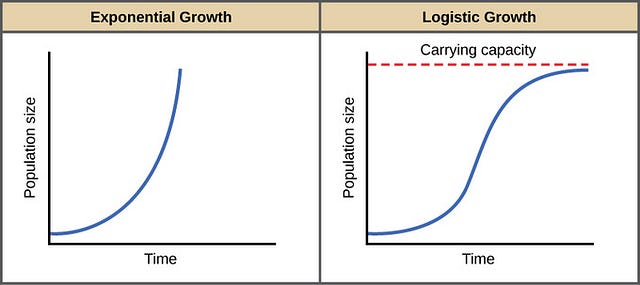
Exponential vs Logistic Growth (Source)
World population, “cheap” energy, and the ‘Global Carbon Budget’
The advent of the fossil fuel age over the last couple of centuries has made available unprecedented levels of energy that humanity has harnessed to satisfy its needs: we probably expended more energy during the twentieth century than in all preceding human history (MacNeill 2000). This has permitted a prodigious leap in economic output as well as important and beneficial breakthroughs in areas such as diet, medical and dental care and greater physical comfort for many within the global family.
However, these gains have come at an enormous cost. The human population has grown by a factor of more than ten since the beginning of the industrial revolution in the mid-eighteenth century from around 700 million to more than 7600 million people today (see World Population Clock).
We are currently eating into natural capital and eroding the ability of natural systems to self-regenerate. This is most critically apparent in the inability of the atmosphere to absorb the level of greenhouse gases we are emitting but is also evident in loss of topsoil, the depletion of aquifers, loss of biodiversity and countless other indicators (Brown 2008).
Moreover, the various social and economic systems we have built on the assumption of continuing cheap energy are highly vulnerable. Not only because the remaining fossil fuel reserves are ever more expensive in their extraction, both economically and ecologically. Even if new discoveries of fossil fuel reserves are being made regularly, we cannot safely use them.
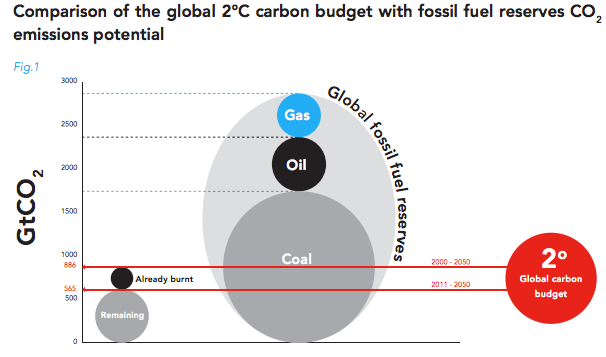
Source: Unburnable Carbon Report 2013 (Carbon Tracker)
Scientific consensus agrees that we have to keep average global warming well below 2ºC [actually well below 1.5ºC to be safer] if we want to avoid dangerous run-away climate change and the end of civilization as we know it. Therefore most of the remaining reserves have to be considered unburnable carbon. Only a small proportion of the remaining reserves are within the global carbon budget which humanity cannot exceed safely.
The human presence on Earth used to be a highly diverse patchwork of regionally adapted socio-ecological-systems with a certain level of self-reliance resulting from predominately regional economies. The process of economic globalization with its obsession with ‘economics of scale’ and ‘increased efficiency’ has eroded this diversity and resilience by super-imposing a more brittle and fragile system addicted to the increasing exploitation of non-renewable material and energy resources with increasingly catastrophic effects on ecosystems and the biosphere.
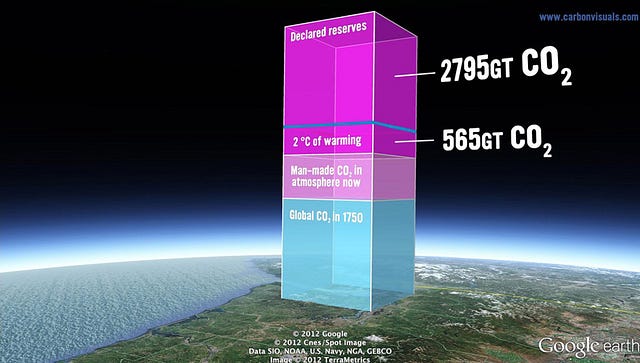 Source: Carbon Visuals
Source: Carbon Visuals
Today, natural and social systems are creaking under the strain imposed upon them by economic forces. Indicators of all kinds — including levels of biodiversity and species extinction, loss of topsoil, water availability, ability of the atmosphere to absorb greenhouse gases, depression, drug abuse, suicide and many others — suggest that the systems we have built are not serving to make either people or the planet happy and healthy. In short, the ways in which we — the global human family — are meeting our needs threatens the very support systems on which we depend.
However, given the globalised nature of the systems we have built, it can often be difficult to trace causal relationships between our behaviours and their impacts. Until relatively recently, within the last century for most people, it was easy to see when we were living beyond the carrying capacity of the places we inhabited: pollution of the air or waterways, over-grazing of pastures and loss of topsoil and trees would have been immediately evident.
Over the last thirty years, however, ecological indicators in most parts of the industrialised world have significantly improved — fish are returning to once dead lakes and rivers, air quality is improving in most cities, many reforestation programmes are being implemented. This could lead us to believe that things are actually improving. The truth, however, is that the economically rich countries have simply exported most of their heavily polluting industries. The worst social and ecological consequences of our economic behaviour are now felt in the Global South — far from the view of the world’s consumer class in the Global North.
…
NOTE: this is an (edited) excerpt from the Economic Design Dimension of Gaia Education’s online course in Design for Sustainability. The first version of this dimension was written in 2008 by my friend Jonathan Dawson, now Head of Economics of Transition at Schumacher College. In 2015–2016, I revised the Design for Sustainability course substantially and rewrote this dimension with more up-to-date information and the research that I had done for my book Designing Regenerative Cultures.
The next installment of the Economic Design Dimension starts on March 19th, 2018 and runs for 8 weeks online. You can join the Design for Sustainability course at any point during the year.


